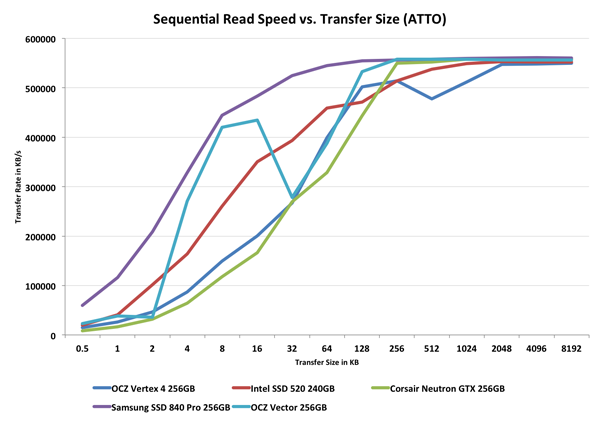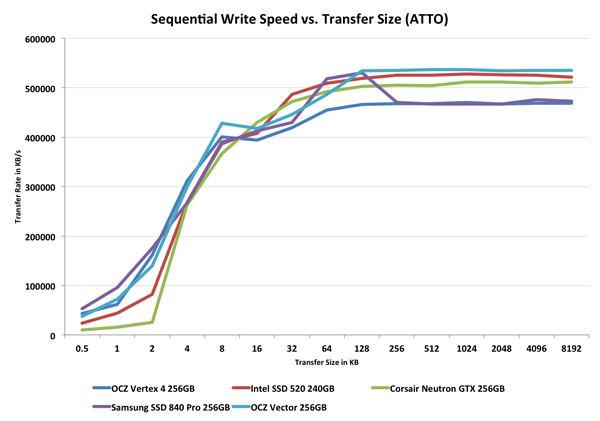OCZ Vector (256GB) Review
by Anand Lal Shimpi on November 27, 2012 9:10 PM ESTPerformance vs. Transfer Size
ATTO does a good job of showing us how sequential performance varies with transfer size. Most controllers optimize for commonly seen transfer sizes and neglect the rest. The optimization around 4KB, 8KB and 128KB transfers makes sense given that's what most workloads are bound by, but it's always important to understand how a drive performs across the entire gamut.
Vector clearly attempts to shift the Vertex 4's performance curve up and towards that of Samsung's SSD 840 Pro. There's a fairly repeatable anomaly at 32KB and 64KB where performance drops down to Vertex 4 levels, but generally speaking there's a tangible improvement across the board. My guess is whatever is happening at 32KB and 64KB is a bug though. Barefoot 3 has no issues parallelizing workloads that are smaller.
I would still like to see improved 512B transfer performance, but other than Samsung it doesn't look like anyone is really focusing on smaller-than-4KB performance anymore. Even Intel has pretty much abandoned focusing on it with its S3700 controller. I may just have to give up caring about it. Smaller than 4KB performance really doesn't impact most client workloads, it's really the weird corner cases where it would matter. Just don't go off and use any of these drives under Windows XP and you'll be fine.
When it comes to write performance, OCZ has delivered a solution that seems to be a hair quicker than the 840 Pro in many of the smaller transfer sizes, and a lot faster once we get to the larger block sizes. Performance vs. the Vertex 4 is clearly improved, and there's only a mild indication of whatever weird issue was happening in the read test.












151 Comments
View All Comments
wsaenotsock - Tuesday, November 27, 2012 - link
A 5 year warranty is a pretty solid commitment on the part of a manufacturer. I don't think they would have done that if they didn't trust the stability of the hardware, so they really put their money where their mouth is.Other thing: is the Indilinx co-processor 'Argon' or 'Aragon'? Pic differs from your text description.
alacard - Wednesday, November 28, 2012 - link
Nah, you've got it all wrong unfortunately - they've bet the farm on this drive and if it fails they won't be around in five years to honor those warranties.When you've got nothing, you've got nothing to lose.
Kjella - Wednesday, November 28, 2012 - link
Well that, but I'm glad to see OCZ committing more to their drives... on my local price price check there's Agility, Colossus, Enyo, Ibis, Lightfoot, Octane, Onyx, Petrol, RevoDrive, Synapse, Vertex and Z-drive not counting numbering or variations like Vertex EX, Vertex Limitied Edition, Vertex Turbo and using a zillion different controllers and stuff. The warranty is also an indication this is the technology they'll continue working on and fixing bugs for, which is good because their attention span has been too short and spread too thin. It's better with a few models that kick ass than dozens of models that are all shoddy.MrSpadge - Wednesday, November 28, 2012 - link
Some of the drives you list are several years old..JonnyDough - Friday, November 30, 2012 - link
Furthermore, the Intel 520 (which I just purchased) got dropped off the enterprise iometer 4KB random write chart. That don't make a lick-a sense!Hood6558 - Wednesday, November 28, 2012 - link
alacard may be right, OCZ is sliding closer to the cliff as we speak. There's so much competition in the SSD market, someone's got to go sooner or later, and it will probably be the less diversified companies that will go first. I recently bought a Vertex 4 128 for my boot drive, and it lasted only 15 days before it disappeared and refused to be recognized in BIOS. The Crucial M4 128 that replaced it has the problem of disappearing every time the power is shut off suddenly (or with the power button after Windows hangs), but comes back after a couple of reboots and a resetting of your boot priorities. And it's regarded as one of the most reliable drives out there.So in order for OCZ to remain solvent, the Vector must be super reliable and stable, and absolutely must stay visible in BIOS at all times. If it's plagued by the same problems as the Vertex 4, it's time to cash out and disappear before the bankruptcy court has it's way.
Sufo - Tuesday, December 4, 2012 - link
Windows hanging? I smell problems with the user...djy2000 - Wednesday, July 31, 2013 - link
That warranty doesn't cover the most important thing. The data on the drive.Bull Dog - Tuesday, November 27, 2012 - link
Is that an m-SATA connector on the other side of the PCB?philipma1957 - Tuesday, November 27, 2012 - link
good question if I open the case can i use this as a msata?a 512gb msata is very hard to find.